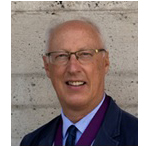
Prof Roger West
Trinity College University
Dublin, Ireland.
Prof Roger West of Trinity College, University of Dublin, Ireland, where he is a Fellow, and has been a leader in innovations in education, researching and lecturing on concrete sustainability matters over his 37 years as an academic, with over 240 peer-reviewed publications. He has delivered lectures, seminars and papers to undergraduates, postgraduates, and delegates at multiple modules, conferences and courses on four continents. He is currently Chair of the Irish Concrete Society.
To Teach is Human
Through decades of teaching under and postgraduate engineering students, the author has had the opportunity to engage students inside and outside the lecture theatre through imaginative innovations in his interactions with them. For example, in first year engineering, in weekly Covid-19 compliant laboratories with more than 250 students attending per week, the fundamentals of sustainable concrete were introduced (using slag concrete with recycled aggregate and bamboo as reinforcement). At sequential test stations a single student, working collaboratively within a group of five, undertook a test following the prior guidance given in on-line technical videos. The performance of the student who conducted the test in front of and supported by his/her peers (through verbal interventions when needed) was marked by a demonstrator based on errors made in the procedures. This group effort, in addition to sharing responsibilities for the subsequent report writing, enhanced the team dynamics where all shared in the successes or failures of each student. The bamboo beams were designed to fail by tension or bond of the bamboo in the concrete depending on the cement paste strength, as determined by the temperature of the curing regime. At Master’s level, mathematical pre-requisites were identified at the start of an advanced structural analysis module so that students can focus on understanding the various pheneomena in elasticity, plates, dynamics and finite elements, and not on the mathematics involved. This is underlined by allowing the students to bring to the examination a single A4 page of closely packed key module equations, developed by them individually in a learning process, which enhances their awareness of how the maths delivers on expectations of behaviour shown to exist in the accompanying laboratories/tutorials. And, finally, the paper will describe how to motivate reluctant Masters students to embrace relevant statistical techniques used in their research projects by exposing them to the author’s observations on the commonplace misuse and abuse of such techniques in student theses and peer-reviewed publications. By inviting students to explain such techniques and show simple examples of their use and abuse, a depository of knowledge in a compiled booklet issued to the class based on their individual research provides one of a number of such assessment outputs which includes fact sheets on concrete chemistry, types, properties, processes,and statistics. By keeping a master booklet over the years, students compete with their predecessors to get their article published instead in the rolled-over annual compilation. In conclusion this keynote address will demonstrate these and other examples of how regular imaginative approaches to the privilege of teaching can illuminate, motivate and creatively enhance the learning experience of students at all levels, a process that is uniquely human.